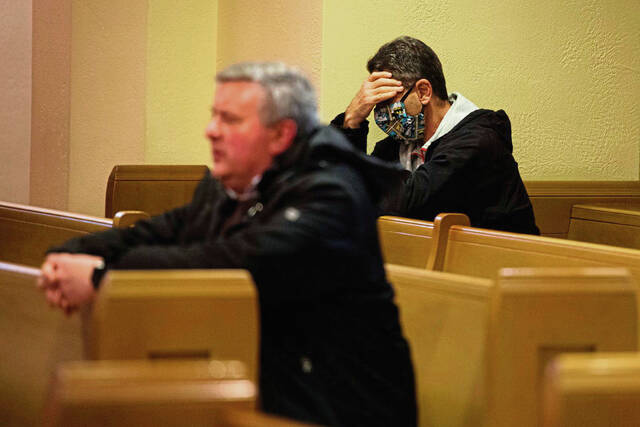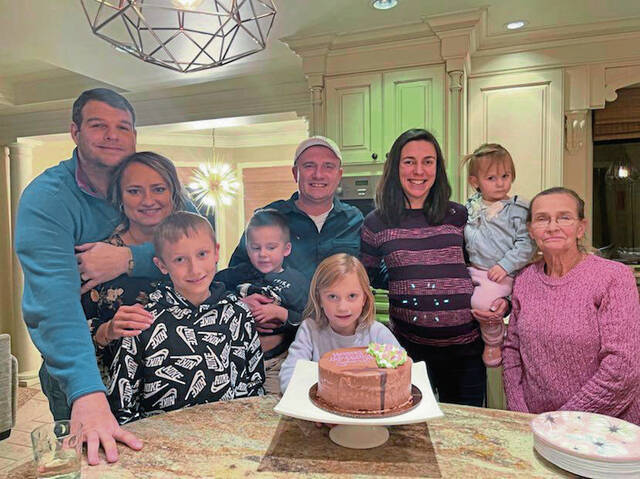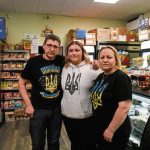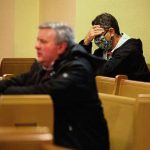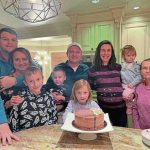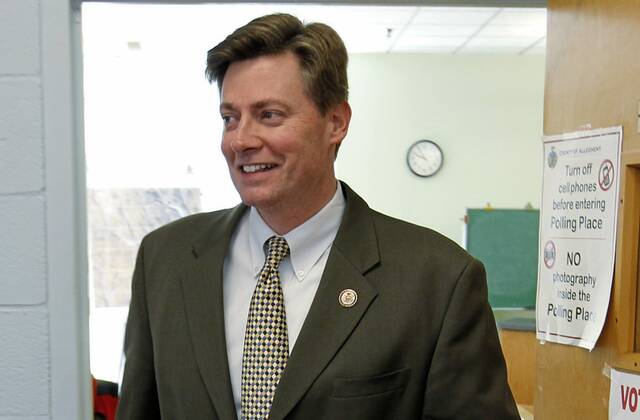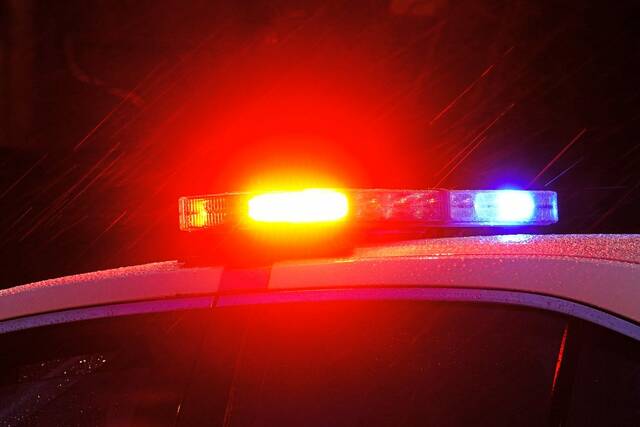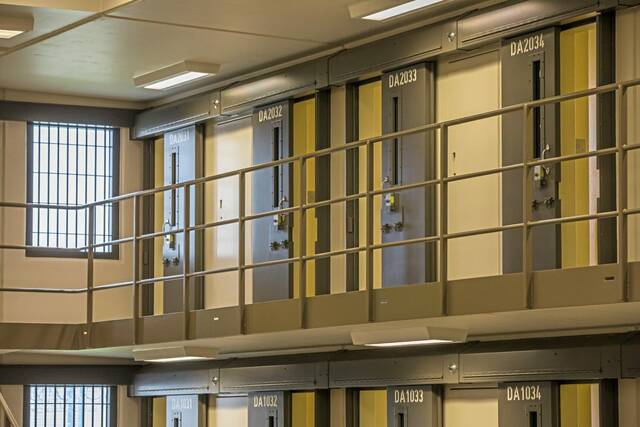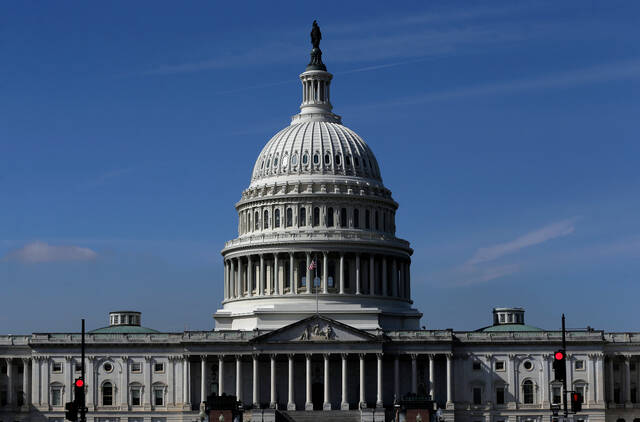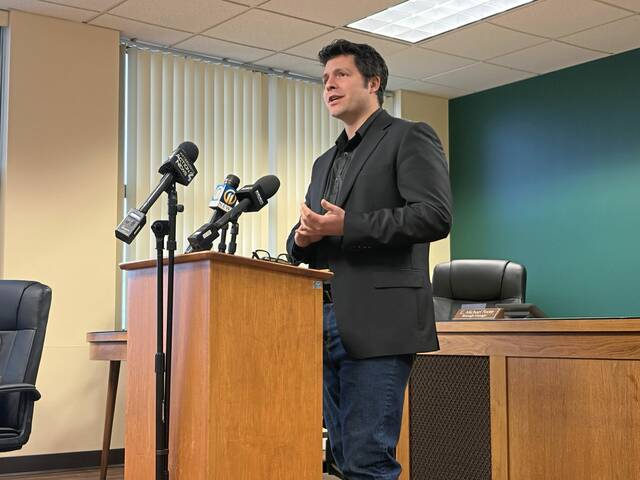Dan Czmola of Penn Hills was expecting to have a Zoom call with someone in Ukraine on Thursday but, after a few days of being in touch, could not get a reply from him.
He said he believes it’s because of Russia’s bombing of Ukraine’s communications facilities as part of Russian President Vladimir Putin’s decision to invade.
“This is what we feared the most. This man is evil,” Czmola said of Putin. “There’s no telling what he is going to do. If you don’t stop someone like this, there’s no telling where he may end up.”
Czmola and his wife, Lisa, are Americans and the children of parents who fled Ukraine after World War II to escape the Russians. They and many other Western Pennsylvanians with Ukrainian roots and connections were coping Thursday with the realization that Ukraine was facing what President Biden called an unprovoked and premeditated attack.
Stas Cherneshoff has been keeping close tabs on the situation in his native Ukraine from his dorm room in Greensburg.
Related:
• Support for Ukraine in Squirrel Hill march unites people from various countries
• Russia's invasion of Ukraine to hit Americans in wallet at gas pump, analyst says
The Seton Hill University sophomore also lived in Moscow, so he is keeping up with friends in neighboring countries as the attack continues. Many of his friends live in Kyiv, the capital of Ukraine, where sirens wailed and explosions were heard Thursday.
“I tried to talk to most of my friends, and they see rockets flying over all the time,” said Cherneshoff, 20. “A lot of my friends, they didn’t feel safe, so they packed up really quickly” and headed west toward Poland.
His grandparents still live in Ukraine but are in a safe area for now, said Cherneshoff, a data science major who lived in Russia for a few years.
Some friends in Moscow are sympathetic to the situation, while others aren’t, he said. Cherneshoff has been monitoring social media posts from the Russian government and said many of his friends are at the age where they might get pulled into fighting.
“I’m scared for Ukraine, and I’m scared for my Russian friends as well,” he said.
The impact on the United States will be profound, said John Sawicki, an assistant professor of political science in the McAnulty College of Liberal Arts at Duquesne University, where he also is director of the Center for International Relations.
“We are witnessing the end of an era. The smug assumption that American military power could stabilize the world is over,” Sawicki said. “If the Russians had any concerns about the United States’ response, this is not what they would be doing.”
Unless Biden wants to get the U.S. military directly involved, there is little America can do, Sawicki said. With about $630 billion in foreign reserves, Russia is well positioned to withstand any economic sanctions, he said.
“The United States has to look for an entirely new security architecture,” he said. “The world is irrevocably changed as of (Wednesday) night.”
On Thursday, Nataliya and Gregoriy Petrylo were glued to the Ukraine YouTube channel inside their store, Nataliya European Food Market in Greenfield. They looked up at the television screen in between waiting on customers.
“My mom is there,” said Nataliya Petrylo. “I have friends there. I did not think this would happen. We are good people, the Ukraine people. We have customers who come in who are from Ukraine and Russia and Poland.”
The couple and two teenage daughters, Hrystyna and Kateryna, live in Scott Township.
Hrystyna Petrylo said she continuously looked at her phone during her classes at Robert Morris University. She said one professor switched the lesson from World War II to conflict in Ukraine in 2014. She and her sister visited Ukraine with their parents for the first time last summer.
Their parents are from western Ukraine.
“This had to be planned,” said Hrystyna Petrylo, as she pulled up a map of Ukraine on her smartphone showing all the attacks marked by stars. “It is hurting people. I feel bad for my parents because this is hitting them harder. They’ve been through this before in their lifetime, and now they are going through it again.”
She and her parents wore shirts with the Ukraine symbol for freedom on them.
Nataliya Petrylo shook her head and looked down at the necklace she was wearing, which also bore the Ukraine freedom symbol.
Gregoriy Petrylo, who usually makes a weekly trip to New York to get products for the store, stood by his wife. He was sad and worried. He turned around to show Ukrainian lettering on the back of his shirt.
“Ukraine is my country,” he said, translating the words.
Roman Catholic Diocese of Greensburg Bishop Larry Kulick on Thursday extended support for Ukrainians locally and across the globe.
During a homily at Blessed Sacrament Cathedral, Kulick urged the faithful to stand united with those under attack and pray for peace and justice.
“Our hearts, our minds, our thoughts, our prayers … go out to the people of Ukraine today for those who are suffering and will continue to suffer,” he said. “We realize how fragile peace is and how, in an instant, it can be destroyed.”
About 40 people attended the service. He ended the homily with a centuries-old prayer that he said is meaningful to the people of Ukraine, saying a few phrases in Ukrainian.
George Honchar, president of the Ukrainian Technological Society, said dozens were expected Thursday evening for a prayer service at Holy Trinity Ukrainian Catholic Church in Carnegie.
The society Honchar leads primarily provides scholarships to needy students of Ukrainian descent. It also undertakes humanitarian efforts but hasn’t yet decided what it will send to Ukraine.
“All this has happened so fast,” Honchar said.
Although Honchar’s grandparents came to the United States more than 125 years ago, he, his children and grandchildren still speak the language.
Honchar said his wife spoke with her son in Ukraine on Thursday morning.
“So far, it’s quiet,” he said. “Quiet but tense.”
“We as Americans did not get our freedoms from King George or from George Washington. Our freedom is a gift from God,” he said. “Putin is taking away this freedom from these good, peace-loving Ukrainian people.”
A second-generation Ukrainian, Bob Goga of Lower Burrell remembers visiting Lviv and Kyiv in 2016.
“Both cities are spectacular, and the people are wonderful,” he said. “I’m very saddened. My heart goes out to them.”
His son, Andy Goga, works in Moldova, a nation between Ukraine and Romania. He is about 30 miles from Ukraine and said thousands of refugees are coming across the border.
As Goga waits on reports from his son, he yearns to be with others of Ukrainian descent.
“I’m looking forward to rubbing elbows with my friends to pinch pierogies at St. Vlad’s on Friday,” he said.
Excela Health director of cardiac surgery Dr. Michael Culig worked for seven years with a hospital in western Ukraine to set up a cardiac catheterization lab, an intensive care unit and an operating room, starting in 1993. At the time, he worked at Shadyside Hospital and traveled to Lviv annually to help with modernization of the health care system.
“I saw them as they were progressing from this communist country to something like a modern country,” he said.
Each year he visited, Culig said, friendships grew and he noticed improvements from businesses to infrastructure. Culig returned to Ukraine in 2019 and saw a transformed country that appeared like many other European cities.
“It has been a real delight,” he said. “It was one of the most rewarding and inspirational things I ever did in my life, to be able to help people who are trying to build a better world for their children.”
“I am so upset about this, but there’s really nothing I can do,” Culig said. “Anything we need to do to help them, I think we need to do.
“If we’re going to have a new world order where people can just invade democratic countries for power and money, it really is the same situation that we were in in 1939 where you got a bully, a dictator who wants to take over large areas of the world strictly for personal prestige and power,” drawing reference to Adolf Hitler and Nazi Germany. “If this happens … a lot of other countries in Europe are going to be threatened.”
Helen Guzensky’s mind immediately went to the same place, calling Putin a “No. 1 Hitler.”
The Monessen woman said Russia invaded Ukraine, the birthplace of her father, “because they want the valuable Ukrainian land.” Ukraine had been known as a “breadbasket” of the Soviet Union empire before its collapse in 1991.
Ukrainian-born Rev. Roman Yatskiv, 58, priest of St. Nicholas Ukrainian Orthodox Church in Monessen, said the Russian invasion is just the latest in a centuries-long oppression of his native country by the Russian czars and then the Soviet premiers.
In the 1930s, the Soviets starved millions in central and eastern Ukraine in what became known as the Holomodor — a man-made famine designed to make farmers accept the collectivization of private farms, Yatskiv said. Their food was stolen and taken to Russia under Soviet dictator Joseph Stalin.
Then, Nazi Germany during World War II invaded Ukraine, which was part of the Soviet Union.
“My country never started any war with any nation,” Yatskiv said.
Pavel Shlyahovsky, of Eighty-Four, came to the U.S. from Ukraine with his family in January 1990.
“It is very heart-wrenching what’s going on in … Ukraine,” Shlyahovsky said. “What boggles my mind is, how the hell is this happening in 2022? I can’t believe this is happening.”
Shlyahovsky has family in Ukraine and was able to reach a cousin who is fleeing to Poland.
“It’s a shame what’s going on there,” he said. “My heart cries out for the people of Ukraine.”
The Rev. Tim Tomson, of South Bend Township, is vice president of the Ukrainian Community of Western Pennsylvania and pastor of St. Mary Ukrainian Orthodox Church in McKees Rocks, where he said a service will be held at 6 p.m. Friday.
Tomson said a cousin in the Ukrainian capital, Kyiv, recently texted him. He said she is scared.
A Sewickley woman whose mother is in Kyiv was not as fortunate. Tomson said the woman’s mother, in her 70s, was driving to a store in a Kyiv suburb when a bomb went off near her and shrapnel hit her in the head.
Tomson’s wife, Svitlana, is from Ukraine but had not spoken with any of her family there.
“She’s very distraught,” he said. “This doesn’t surprise me that this happened. Mr. Putin is an evil man. He wants to bring back the Russian empire. I’m not against Russia, I’m against Russian imperialism.”
Czmola said Ukraine needs help.
“They have a large military but their weaponry is poor. They need Javelin rockets, ammunition and weaponry that they can use to fight. They will fight, but they need better weapons,” he said. “That’s what we desperately need the United States to do a lot more. These sanctions, that’s not going to stop Putin.”
Yatskiv, who also is the priest at a larger Cleveland church, said his parishioners have sent money to Ukraine to buy ammunition, safety helmets and vests.
“There have been so many people who have donated,” said Yatskiv, who immigrated to the United States in 1998, followed by his two children in 2000. Czmola said he hears the same thing from others of Ukrainian descent in the Pittsburgh area — that Putin was going to launch a war had been obvious for months.
“If somebody had done something immediately when they saw his aggression, he might have stopped. Once he had everything all lined up, sanctions aren’t going to do it,” he said.
“If we don’t stop him now, there’s no telling where this will go,” he said. “If he attacks Estonia, the NATO agreement is: if you attack one of us, you attack all of us. We’re going to be dragged into a war. Our soldiers will have to go there and fight.”



